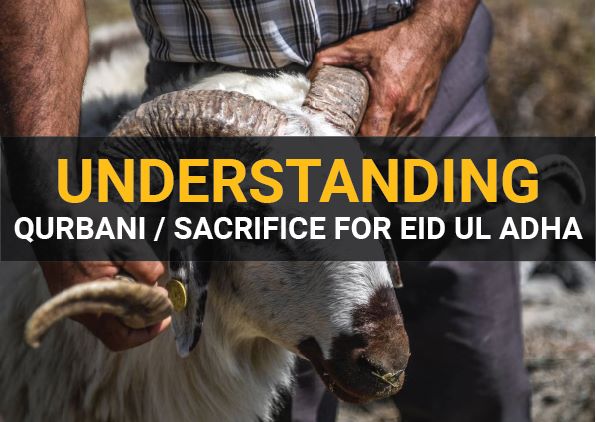Qs. What is meant by the terms “udhiya” or sacrifice on Eid ul Adha? Does this follow under obligatory act of worship?
Ans: Allah (عَزَّوَجَلَّ) has commanded the sacrifice of the “an’aam,” (grazing livestock including goat, cow, camel, sheep or lamb) during Eid-ul-Adha for the purpose of attaining nearness to Him. This is what is technically referred to as the sacrifice of Eid-ul-Adha or udhiya or qurbani (in Urdu).
To carry this sacrifice out as per command is one of the rites of Allah (عَزَّوَجَلَّ). The details of this command can be found in the Sunnah of the Prophet ﷺ and its following by the Muslims who followed after.
In the Qur’an, Allah (عَزَّوَجَلَّ) says:
قُلْ إِنَّ صَلَاتِي وَنُسُكِي وَمَحْيَايَ وَمَمَاتِي لِلَّهِ رَبِّ الْعَالَمِينَ
Say, “Indeed, my prayer, my rites of sacrifice, my living and my dying are for Allah, Lord of the worlds.
[Surah Al-An’am:162]
Allah (عَزَّوَجَلَّ) has also stated:
And for all religion We have appointed a rite [of sacrifice] that they may mention the name of Allah over what He has provided for them of [sacrificial] animals. For your god is one God, so to Him submit. And, [O Muhammad], give good tidings to the humble [before their Lord] [All-Hajj:34]
In a hadith we learn:
It is narrated by Anas (رَضِيَ ٱللَّٰهُ عَنْهُ) that the the Prophet (ﷺ) slaughtered two rams, black and white in color (as sacrifices), and I saw him putting his foot on their sides and mentioning Allah’s Name and Takbir (Allahu Akbar). Then he slaughtered them with his own hands.
(Sahih Bukhari 5558)
In another hadith it is clearly stated:
It is narrated by Ibn Umar (رَضِيَ ٱللَّٰهُ عَنْهُ) “The Messenger of Allah (ﷺ) stayed in Al-Madinah for ten years performing the Udhiyah.
(At-Tirmidhi:1507)
We continue to find evidence of sacrifice in the Sunnah by the following hadith”
Narrated `Uqba bin ‘Amir Al-Juhani:
Prophet (ﷺ) distributed among his companions some animals for sacrifice (to be slaughtered on `Id-al-Adha). `Uqba’s share was a Jadha’a (a six month old goat). `Uqba said, “O Allah’s Messenger (ﷺ)! I get in my share of Jadha’a (a six month old ram).” The Prophet (ﷺ) said, “Slaughter it as a sacrifice.”
(Sahih Bukhari 5547)
Narrated Al-Bara (رَضِيَ ٱللَّٰهُ عَنْهُ),
“The Prophet (ﷺ) said, “Whoever slaughtered (the sacrifice) after the prayer, he slaughtered it at the right time and followed the tradition of the Muslims.”
(Sahih Bukhari 5545)
Through these ahadith, we learn that the Prophet ﷺ himself sacrificed an animal on this occasion and so the Sahabas (Radi Allahu Anhum) continued this command. The Prophet ﷺ instructed that offering sacrifice is the way of the Muslims.
Hence, there is consensus on the conditions of sacrifice. Yet, there is a dispute whether offering sacrifice on this occasion is a Sunnah mua’kkadah (confirmed sunnah)or wajib (a command which is an obligation and cannot be omitted).
The majority of the scholars are of the opinion that it is a Sunnah mu’akkadah. This is the view of Imam Al-Shaafa’i, Imam Maalik and Ahmad according to his most well-known view. Others are of the view that it is obligatory. This is the view of Imam Abu Haneefah and one of the views narrated from Ahmad.
Yet, other scholars have considered the sacrifice as wajib. This is the view of Imam Abu Hanifa (Rahimullah) and Imam Ahmad. Ibn Tahmiyah (Rahimullah) has also stated the same taking the proof from Imam Malik. (Ibn Uthaymeen)
Shaykh Muhammad ibn Uthaymeen (Rahimullah) said: “Udhiyah is Sunnah mu’akkadah for the one who is able to do it, so a person should offer the sacrifice on behalf of himself and the members of his household.” (Fataawa Ibn ‘Uthaymeen, 2/661)











